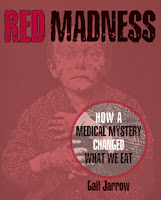By Jan Pease
One of my mother’s catch phrases was “it’s a buggy year.” It almost always was a buggy year, no
matter what state we lived in. Perhaps
she would have approved of a charming book by Sarah Albee, “Bugged: How Insects
Changed History.” The book
is printed in purple ink with green accents, and as the cover says, it’s
“swarming with facts!” Chapters
include “Close Encounters of the Ancient Kind,” “More Thinking but Still
Stinking: The Renaissance,”
and other great chapter titles.
 Two new nonfiction
picture books tackle significant issues. “Harlem Hellfighters,” by J. Patrick Lewis and Gary
Kelley, tells the story of the
369th Infantry
Regiment, the 15th New
York National Guard in the First World War. The army was segregated, and these
brave black men from New York City proved themselves as they did whatever was
required of them. They also
brought the sound of Harlem jazz to France.
Two new nonfiction
picture books tackle significant issues. “Harlem Hellfighters,” by J. Patrick Lewis and Gary
Kelley, tells the story of the
369th Infantry
Regiment, the 15th New
York National Guard in the First World War. The army was segregated, and these
brave black men from New York City proved themselves as they did whatever was
required of them. They also
brought the sound of Harlem jazz to France.
“Separate is
Never Equal: Sylvia Mendez and Her Family’s Fight for Desegregation,” by Duncan
Tonatiuh, received both the Pura Belpre Award and the Robert F. Sibert Honor
Book. This remarkable book
explains how a brave girl and her family fought for her right to attend regular
school in California.
 “Over the Hills and Far
Away” is a treasury of nursery rhymes collected by Elizabeth Hammill. The rhymes are
“Over the Hills and Far
Away” is a treasury of nursery rhymes collected by Elizabeth Hammill. The rhymes are
“The Pilot and the
Little Prince,” a nonfiction picture book by Peter Sis, tells about the life of
Antoine De Saint Exupery, the author of “The Little Prince.” Information about the
early days of aviation is packed into this slim volume about a beloved author and incredibly
interesting man.
 David J. Smith has
written a nonfiction picture book titled “If… A Mind-Bending New Way of Looking
at Big Ideas and Numbers.” For example, Mr. Smith says, “If all the food
produced around the world in one year were represented by a loaf of bread with
25 slices … 11 slices of bread would come from Asia, but 13 ½ slices would be
eaten by Asians. “ It
really is an interesting way to look at global issues.
David J. Smith has
written a nonfiction picture book titled “If… A Mind-Bending New Way of Looking
at Big Ideas and Numbers.” For example, Mr. Smith says, “If all the food
produced around the world in one year were represented by a loaf of bread with
25 slices … 11 slices of bread would come from Asia, but 13 ½ slices would be
eaten by Asians. “ It
really is an interesting way to look at global issues.
Finally, a substantial
nonfiction book by Gail Jarrow, “Red Madness,” explores Pellagra, the devastating illness caused by poor
diet. This is the reason our bread and so
many other foods are enriched, but for many years it was a medical
mystery.
These books are waiting
for you at Litchfield Public Library.




